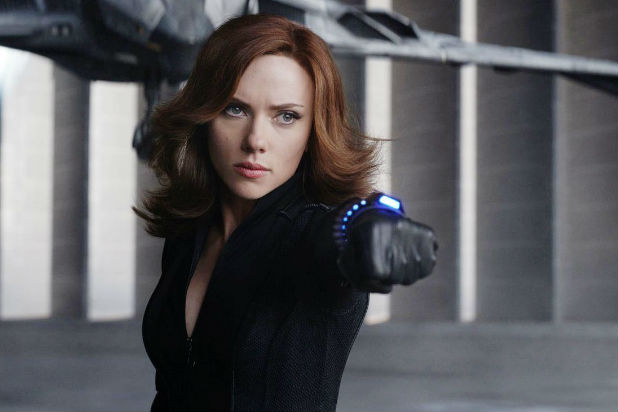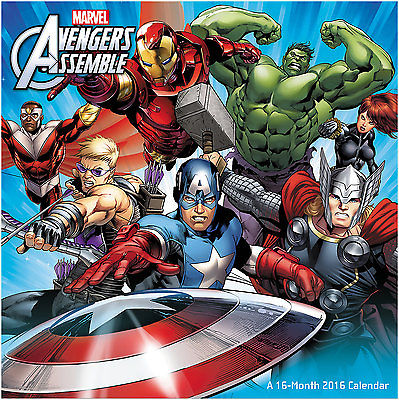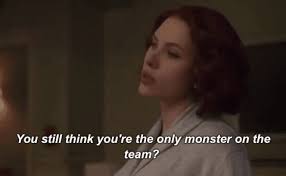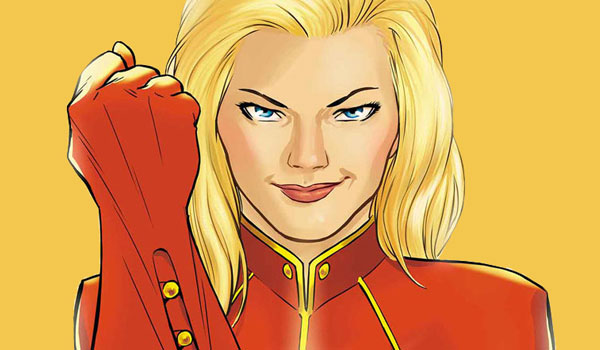Surviving on Table Scraps: When Will Women Control Their Own Stories in Hollywood?

How amazing is it that women are still expected to be delighted with scraps from under the table in mainstream movies? Despite the fact that the extremely belated Wonder Woman movie has no female writers on staff, we are expected to be ecstatic (and to be honest, we are) that at least a woman, Patty Jenkins, has been chosen to direct. And we even get a Barbie doll!
Meanwhile, Captain America has three movies, Iron Man has three, Hulk has two, Thor has two (with the third movie, Ragnarok, on its way). Batman has nine live-action films to his name, and Superman boasts a full ten (counting Batman v Superman for both). Guess which characters below, from the calendar hanging in my nerdy room, do not have a feature movie. I’ll wait.
Yep, Falcon and Black Widow. I have a hard time believing that’s a coincidence, and I’m not alone.
Of course, Hawkeye will always be heralded as the exception, which bros like to bring up to prove the white male rule, but the truth is, major franchises led by anything other than Caucasian men are still remarkably rare, especially in genre pieces like sci-fi and superhero movies. The sad thing is when the fans finally get what they want, white dudes still are given the jobs of directing and writing characters they really have no lived experience with or understanding of, and we end up with something like Elektra (2005), Supergirl (1984) or Catwoman (2004). If you’re cringing in the back of your neck, don’t worry, so am I.
This is a reason Jessica Jones and the most recent incarnation of Supergirl (2015) have been so successful (and why Luke Cage’s upcoming Netflix series has so much hype behind it). They employ what I like to call “representative showrunners.” Melissa Rosenberg, Cheo Hodari Coker, and Ali Adler give us personal dimensions and emotional understandings of these characters that a non-representative showrunner simply could not.
Which brings us to Joss Whedon and Ghostbusters. The number of female-led projects this man has been offered since Buffy are staggering. A possible Wonder Woman movie was in his lap, along with a possible Sailor Moon movie. Really? Because when I think brilliant Japanese manga- artist and storyteller Naoko Takeuchi, I think Joss Whedon. No, not so much.
As a Black Widow fangirl myself, it was particularly disappointing to see how Whedon addressed Natasha’s infertility in Avengers: Age of Ultron (2015). The aspect of Natasha having been sterilized is significant in that it represents a Kafkaesque dehumanization: little WWII orphan girls are subjected to the Kudrin treatment in the Red Room, and pitted against one another in intense competition for the #1 slot. This attitude is all about deep female friendships being decimated in subservience to an unfeeling state. No wonder then, that Melina Vostokova, the Iron Maiden (one of Natasha’s greatest adversaries), was always second best in the Red Room. The point is the insane pressure women undergo to win that one spot on the team they are afforded. To Whedon, though, it’s simply about a desire for motherhood. Talk about missing the point, entirely.
Directors like Amy Heckerling and the late Nora Ephron have shown many times that women behind the camera can handle comedy and drama in equal measure. So why now is a director like Paul Feig or Joss Whedon necessary to helm a female-led film?
This is not to say that female character movies, books, TV shows and written or directed by women instead of Joss Whedon or Paul Feig, or others of their ilk, will be perfect (or that Whedon and Feig’s work is inherently bad because of their gender). There will be missteps, regardless. The Black Widow comics and books I read by Marjorie Liu and Margaret Stohl are likewise imperfect, like all works of art, and limited in their genres. For example, Margaret Stohl’s Black Widow: Forever Red gave a terrifying portrayal of child abuse at Natasha’s mentor’s hands, but was perhaps limited in its genre as a YA novel to include a teenage romance.
The treatment of Reva Connors in the Jessica Jones series and the lack of a solid female perspective in the OJ: Made in America documentary exemplify otherwise great work with blind spots. It seems to me, though, that if you plan to adapt a series like Sailor Moon one might possibly consider hiring a woman of Japanese descent to helm the production.
This ultimately boils down to jobs and money. More powerful entertainment positions lead to conditions that will reduce inequality, but also allow for more personal, profound stories that feel real because of that lived experience.
Another challenge to this scenario is that, up until now, white men not only starred in most of these stories, but they wrote most of them, and repeatedly get credit for it. They created Amanda Waller and Black Widow, and unintentionally revealed biases as they did so. It will take a lot of deconstruction to adapt femme-fatale turned chick-who-can-hang Black Widow and character-with-really-problematic-sexual-assault-scenes Carol Danvers, but women have already shown multiple times we are up to the task: what more do we have to do to be given the keys to the car?
For all the women and little girls who have dreamed up ideas in their head, and written their novels and their comics and their screenplays about their heroines, I hope they don’t give up. My screenwriting teacher told me that her friend Meg LeFauve will be working as a writer on the upcoming Captain Marvel (2019) movie, and I am excited for it, I really am. For now, we will take a few more table scraps. But realize that womankind will not be waiting forever before we demand the entire meal. The longer we wait, the hungrier we get.
Want more stories like this? Become a subscriber and support the site!
Elizabeth is a Seattleite writer/ filmmaker. She has a BA in History and is on the epic quest of looking for her next Master’s degree. A neophyte to the freelance writing scene, she reads way too many Black Widow comics and drinks copious amounts of Thai Iced Tea. You can read her uncut musings on her blog and follow her on twitter @Elizabe31242685.
—The Mary Sue has a strict comment policy that forbids, but is not limited to, personal insults toward anyone, hate speech, and trolling.—
Follow The Mary Sue on Twitter, Facebook, Tumblr, Pinterest, & Google+.
Have a tip we should know? [email protected]


